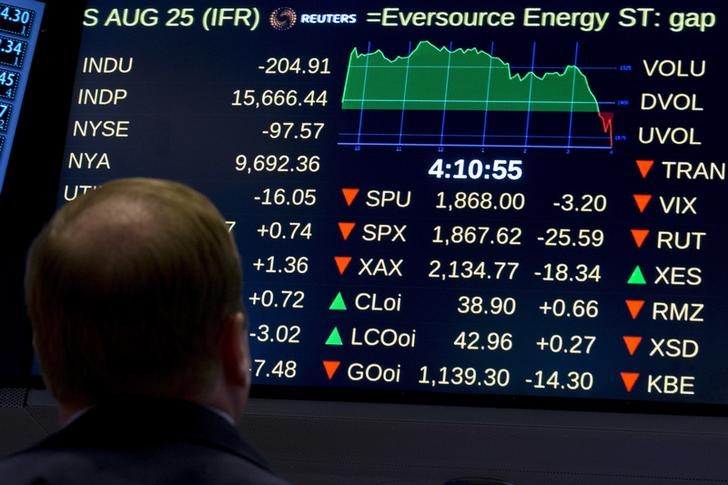* Asian stock markets : https://tmsnrt.rs/2zpUAr4
* Fears of distressed selling as bond selloff deepens
* U.S. 10-yr yields ease after spike to one-year high
* Australia's central bank tries to stem bond bleeding
* Asian shares ex-Japan hit one-month trough
By Wayne Cole and Swati Pandey
SYDNEY, Feb 26 (Reuters) - Asian stocks fell by the most in nine months on Friday as a rout in global bond markets sent yields flying and spooked investors amid fears the heavy losses suffered could trigger distressed selling in other assets.
In a sign the gloomy mood will reverberate across markets, European and U.S. stock futures were a sea of red. Eurostoxx 50 futures STXEc1 lost 1.7% while futures for Germany's DAX FDCx1 and those for London's FTSE FFIc1 dropped 1.3% each.
MSCI's broadest index of Asia-Pacific shares outside Japan .MIAPJ0000PUS slid more than 3% to a one-month low, its steepest one-day percentage loss since May 2020.
For the week the index is down more than 5%, its worst weekly showing since March last year when the coronavirus pandemic had sparked fears of a global recession.
Friday's carnage was triggered by a whiplash in bonds.
The scale of the sell-off prompted Australia's central bank to launch a surprise bond buying operation to try and staunch the bleeding. on the 10-year Treasury note US10YT=RR eased back to 1.538% from a one-year high of 1.614%, but were still up a startling 40 basis points for the month in the biggest move since 2016.
"Bond yields could still go higher in the short term though as bond selling begets more bond selling," said Shane Oliver, head of investment strategy at AMP.
"The longer this continues the greater the risk of a more severe correction in share markets if earnings upgrades struggle to keep up with the rise in bond yields."
Markets were hedging the risk of an earlier rate hike from the Federal Reserve, even though officials this week vowed any move was long in the future.
Fed fund futures 0#FF: are now almost fully priced for a rise to 0.25% by January 2023, while Eurodollars 0#ED: have it discounted for June 2022.
Even the thought of an eventual end to super-cheap money sent shivers through global stock markets, which have been regularly hitting record highs and stretching valuations.
"The fixed income rout is shifting into a more lethal phase for risky assets," says Damien McColough, Westpac's head of rates strategy.
"The rise in yields has long been mostly seen as a story of improving growth expectations, if anything padding risky assets, but the overnight move notably included a steep lift in real rates and a bringing forward of Fed lift-off expectations."
Japan's Nikkei .N225 shed 3.7% and Chinese blue chips .CSI300 joined the retreat with a drop of 2.5%.
EMERGING STRAINS
Overnight, the Dow .DJI fell 1.75%, while the S&P 500 .SPX lost 2.45% and the Nasdaq .IXIC 3.52%, the biggest decline in almost four months for the tech-heavy index.
Tech darlings all suffered, with Apple Inc AAPL.O , Tesla Inc TSLA.O , Amazon.com Inc AMZN.O , NVIDIA Corp NVDA.O and Microsoft Corp MSFT.O the biggest drags.
All of that elevated the importance of U.S. personal consumption data due later on Friday, which includes one of the Fed's favoured inflation measures.
Core inflation is actually expected to dip to 1.4% in January, which could help calm market angst, but any upside surprise would likely accelerate the bond rout.
The surge in Treasury yields also caused ructions in emerging markets, which feared the better returns on offer in the United States might attract funds away.
Currencies favoured for leveraged carry trades all suffered, including the Brazil real, Turkish lira and South African rand.
The flows helped nudge the U.S. dollar up more broadly, with the dollar index rising to 90.371. It also gained on the low-yielding yen, briefly reaching the highest since September at 106.42 JPY= . The euro eased a touch to $1.2152 EUR= .
The jump in yields has tarnished gold, which offers no fixed return, and dragged it down to $1,760.8 an ounce XAU= from the week's high around $1,815.
However, analysts at ANZ were more bullish on the outlook.
"We now expect U.S. inflation to hit 2.5% this year," they said in a note. "Combined with further depreciation in the U.S. dollar, we see gold's fair value at $2,000/oz in the second half of the year."
Oil prices dropped on a higher dollar and expectations of more supply. O/R
U.S. crude CLc1 fell 67 cents to $62.86 per barrel and Brent LCOc1 also lost 67 cents to $66.21.
<^^^^^^^^^^^^^^^^^^^^^^^^^^^^^^^^^^^^^^^^^^^^^^^^^^^^^^^^^^^ Asia stock markets
https://tmsnrt.rs/2zpUAr4 Asia-Pacific valuations
https://tmsnrt.rs/2Dr2BQA
^^^^^^^^^^^^^^^^^^^^^^^^^^^^^^^^^^^^^^^^^^^^^^^^^^^^^^^^^^^> (Editing by Sam Holmes)
